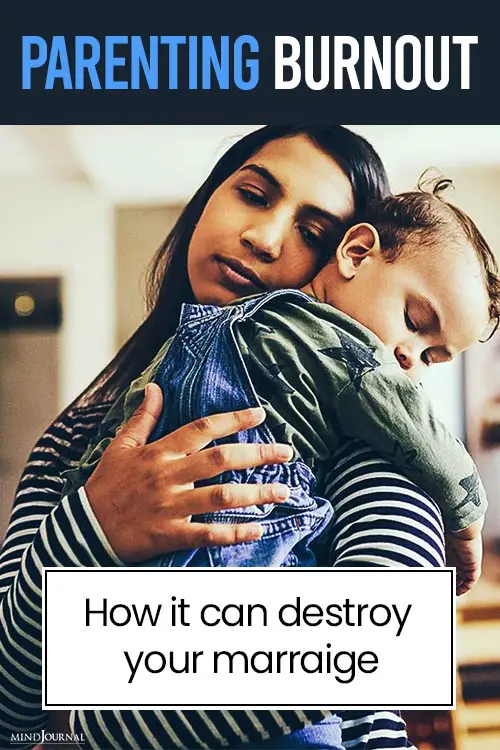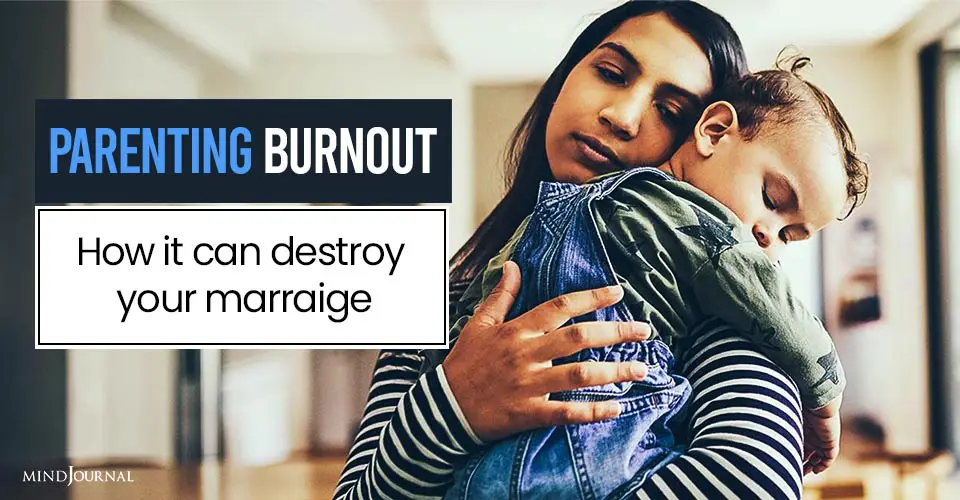Have you ever heard of parenting burnout? Parenting burnout is a hidden killer that ends up destroying more marriages than what people actually know of. Scary, but true. Having a child can bring so many positive changes in your married life, but if you do not take a break now and then, it will end up being detrimental for you and your marriage.
Why do so many couples unravel while parenting? Why do so many marriages self-destruct?
Of the kinds of parenting dilemmas I see in my office, parent burnout is among the most common and unrecognized. Remarkably, most parents don’t even realize they’re suffering from it. Ask these parents when was the last time they took a break from parenting and they stare at you stupefied: “You’re allowed to take a break?”
Alarming Parenting Statistics
According to a Wall Street Journal article “Here Comes the Baby, There Goes the Marriage” approximately two-thirds of couples see the quality of their relationship plummet within three years of the birth of a child—with mother’s’ dissatisfaction leading the way, and more women filing for divorce than men. Within five years after the birth of a first child, over 40 percent percent of couples will go their separate ways. Some studies report marriages failing within 18 months after the first child is born.
Clearly, couples are painfully unprepared for the demands of parenting; in fact, parenthood may be a frequent cause of separations, divorces, and failed relationships. (See “Top Ten Parenting Mistakes“)
Signs of Parenting Burnout
If you’re a burnt-out parent, you’re exhausted in every way; you’ve neglected yourself without mercy. Depleted emotionally, intellectually, and creatively, you stumble through your routines, doze off in mid-sentence, or stare at a computer or television screen in a weary hypnotic trance. You’ve probably even forgotten that you have needs. Is it any wonder that you suffer low energy, mood swings, and over-the-top reactions to frustration?
If you find yourself humorless, angry, critical often—maybe it’s not your child, partner or friends; maybe it’s you.
The Roots of Self-Neglect
From the very beginning, parenting is rough on your body and mind. You sleep less, eat more. Healthy habits deteriorate. You stop exercising or socializing (especially with “non-parent” types). Gradually, your life drifts off course, and your relationship sours.
What’s more, children are gifted crisis creators, no matter what their age. They get sick, have accidents, lose things, and continually rearrange your priorities. The more time you spend running after them and tending to their needs, the less time you spend tending to your own.
Self-reflection is gone from your life. Soon you find yourself living in a reactive state, forever responding to your kid’s never-ending wants while ignoring your partner’s needs too. Is it any wonder that your relationship starts to unravel?
Related: 3 Radical Acts of Self Care That will Help You Heal After Burnout
Personal Experience
In the year after the birth of my first child, I unwittingly gained thirty-three pounds. With new financial demands, I worked more hours than ever before. I ate poorly, slept poorly, suffered chronic back pain, and what little hair I had left on top of my head was soon gone. Seriously, all of it—gone!
The worst part was the toll parenting took on my marriage. My wife and I spent less quality time together. And when we did, one of us was usually falling asleep in the middle of a conversation. In the mornings, we’d bump up against each other near our coffee machine with this intimate exchange:
“Hey.”
“Hey.”
It took us years to overcome parent burnout—but it doesn’t have to take you that long.
From Self-Neglect to Self-Care
Taking care of yourself is a vital part of being a good parent and a good partner. To get your life back, you don’t need to spend a fortune on therapy. Start your recovery by reviewing this burnout prevention checklist.
1. Schedule a Weekly Date.
Being a parent is not an identity—it’s part of who you are. As soon as possible, arrange for babysitters—relatives, neighbors, friends. It’s crucial you put aside time for yourself and your partner. This is often surprisingly difficult, especially when you’ve fallen into the habit of self-neglect.
Turn your attention to new topics and activities that have nothing to do with parenting. A well-rounded parent is always better than a burnt-out parent.
2. Keep Exercising.
I say this all the time in parent workshops, and here I go again: A cardio workout, thirty minutes for three times a week or more, cuts anxiety and depression up to 70 percent in most people. Walk, run, swim, bike, dance…whatever you fancy. You’ll feel better, have more energy, and less appetite for comfort food. If you have trouble committing to a weekly workout, sign up for a class, get a trainer or a gym buddy. Most parents report feeling better almost immediately. (See “Where Do You Store Stress in Your Body?”)
Creativity is a wonderful tension outlet. It soothes angst, awakens your muse, and brings new dynamism into your life. Look for new creative outlets or resurrect inspired activities that you enjoyed before you became a parent. Children love to see their parents be creative. It’s good modeling for your kid and good self-care for you.
3. Personal Adventures.
Parenting doesn’t end personal growth. If you’re stagnating in the same old routine, surfing the net, or watching an entire season of a NetFlix series in a few days, chances are you’ve stopped challenging yourself. Kids respect parents who have a sense of purpose or mission that is beyond parenting.
Take a class, go to a museum, explore continuing education, attend a concert, join a writing group or book club, or take up another language. Look for activities that will stimulate you intellectually, emotionally, and creatively in new ways.
4. Keep Socializing.
Parenting can be very isolating. Spending every moment of your free time with your kids is not good for you or for them. Don’t let your friendships fade away; pick up the phone, set up a time to see each other.
And for goodness sake, give the parenting-themed conversations a rest. You’ll be surprised how relieved you feel.
Related: Burnout: 6 Signs You’re Ready To Hit The Wall
Revitalize Your Life & Revitalize Your Relationship
Children want parents that they can be proud of. It strengthens and fortifies them, builds their confidence, and strengthens their sense of self. When you neglect yourself or succumb to burnout, you deny your kid a crucial need of pride in his or her parent. To cure your burnout and get your relationship back on track, start by weeding out the noxious roots of self-neglect. Not only for you and your partner but for your child’s well-being.
For more such informative articles, visit www.SeanGrover.com
Written By Sean Grover
Originally Appeared In Sean Grover
When you have a child, your life changes, and as usual, there is good with the bad. Parenting burnout is a serious and legitimate issue that plagues many married couples; while some are able to overcome it, some marriages end up biting the dust. If you don’t want your marriage to a part of the latter, then follow these pointers to have both your child and your marriage on healthy and positive grounds.









Leave a Reply
You must be logged in to post a comment.